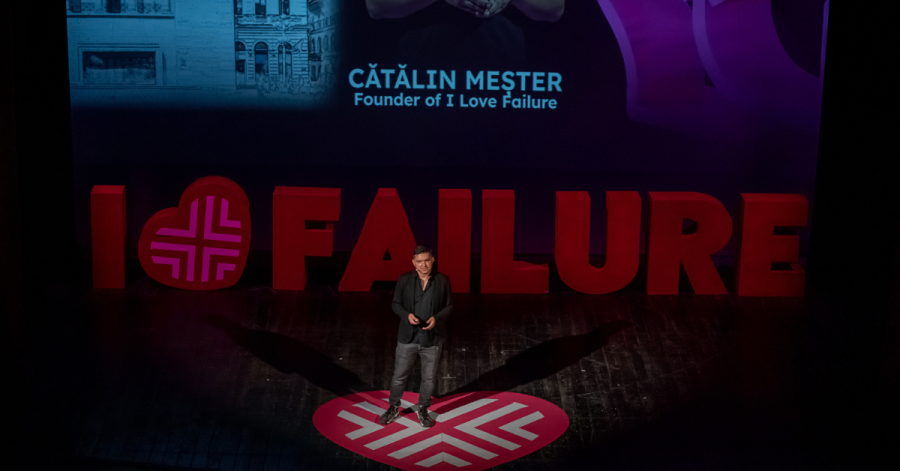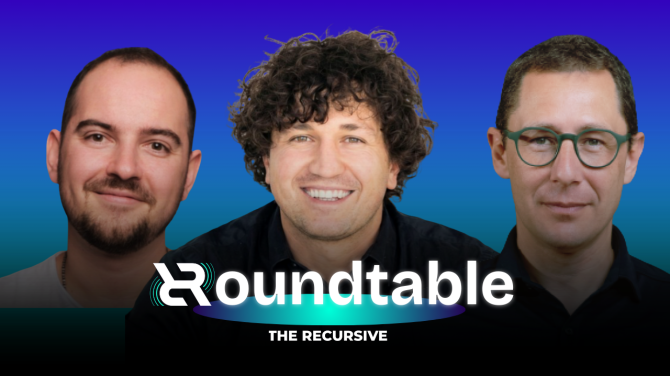Failure is often seen as something to avoid, but for Catalin Mester, Romanian serial entrepreneur, community builder, and founder of I Love Failure conference – it’s the key to unlocking true innovation and leadership. In this candid conversation, we explore the journey behind I Love Failure, a movement born from Catalin’s own struggles and his realization that sharing setbacks could inspire others. As the upcoming conference in Bucharest approaches, with a fresh focus on innovation, Catalin reveals why a healthy relationship with failure is essential in today’s fast-paced world.
What’s different about this year’s conference?
This year’s conference’s main theme is INNOVATION, and although we still have a very varied lineup of speakers and stories, we will have a deeper focus on business, innovation, and the fear of failure. This year, we also have international speakers like Chris Koch and Andrew Young, who will share unique stories and perspectives on failure, resilience, and leadership.
Why is it important to have a good relationship with failure in business?
You see, your relationship with failure and your willingness to try will define how far you go as a person, how many risks you take, and how far you venture into the unknown.
While on a personal level this is primarily about you, when it comes to innovation and leadership, you often venture into the unknown with a team. You not only have to manage your fear of failure but also inspire and lead your team. Imagine starting a startup with someone who blames everyone else for failures and cannot manage their own fear of failure or reactions to adversity. How can this person lead others in this territory?
Why should companies adopt the I Love Failure mentality?
We live in tough times and the interpersonal and company relationship with failure and setback has become one of the most important competitive advantages. Companies simply don’t have the time to hide problems under the rug, can’t afford not to have the awkward conversations asap, identify and manage conflicts.
How do you go about selecting and inviting speakers for the conference, and what qualities do you look for in a speaker?
Selecting and inviting speakers for the I Love Failure conference involves a thoughtful process aimed at finding individuals who can effectively convey the event’s core message about embracing failure as a stepping stone to success. Here are some key steps and qualities to consider:
- Relevance to Theme: Look for speakers who have personal or professional experiences related to failure and resilience. Their stories should align with the conference’s focus on learning from setbacks.
- Diverse Backgrounds: Aim for a variety of perspectives by inviting speakers from different fields, such as entrepreneurship, education, psychology, and the arts. This diversity enriches the discussions and appeals to a broader audience.
- Engaging Storytellers: Select speakers who are not only knowledgeable but also compelling storytellers. Their ability to connect with the audience through relatable narratives can inspire and motivate attendees.
What is the most rewarding aspect of organizing ILF?
The most rewarding aspect of organizing the “I Love Failure” conference is witnessing the transformative impact it has on both speakers and attendees. It’s incredibly fulfilling to create a platform where individuals can share their stories of overcoming challenges and learning from setbacks. Seeing participants connect, engage in meaningful discussions, and leave inspired to embrace failure is amazing.
How did the project I Love Failure come to be?
The project was born at the lowest point of my life, during a time when I couldn’t even take a walk in the park without hearing a voice in my head saying, “You’re too far out, come back.” Fear had reached its peak during that period.
It all started at a business event I attended. There, I tried to ask questions to the speakers on stage, but I couldn’t bring myself to stand up and be seen, so I gave up. All the speakers were presenting only the positive side of things, and it seemed like everyone, except me, knew what they were doing. At the networking session, I met an acquaintance with a startup that had just failed. I started a conversation with him, and he became vulnerable, sharing his story of bankruptcy, divorce, and all the related problems. For 15 minutes, I was fascinated and, for the first time, I felt I was not the only one who didn’t know what they were doing. I felt courage.
At that moment, I had a thought: if this guy had been on stage, I believe everyone would have felt what I felt, and people would have connected with him. So, that evening, I decided to organize the first event where I would be on stage with two other entrepreneurs, and we would talk about failures and the lessons learned.
When choosing the name, I thought about Martin Luther King and his “I Have a Dream” speech, and how people react more personally when there is an “I” at the beginning. That’s how I Love Failure was born.
To my surprise, at that first event, even though I had only posted an announcement, the room was full, and it has remained that way ever since.
How do you see the I Love Failure movement progressing in the next few years?
If I were to share the entire plan, you might think I’m crazy, but here it is. I envision I Love Failure conferences, events and studios in many cities around the world. I see I Love Failure being integrated into companies, schools, governments, and healthcare systems. I also envision the I Love Failure app becoming the “Netflix of Failures”—the go-to personal development app where you are constantly reminded that you are not alone and have all the tools you need to grow as an individual or as a company. Here you can browse failures and lessons learned by categories, romance, business, tech, HR, gambling, schools etc.
This year’s I Love Failure: conference is set to happen in Bucharest on October 21-22. For more details about it, check out their website. For securing your ticket, don’t forget to use the code ILFRECURSIVE20 for a 20% discount.








